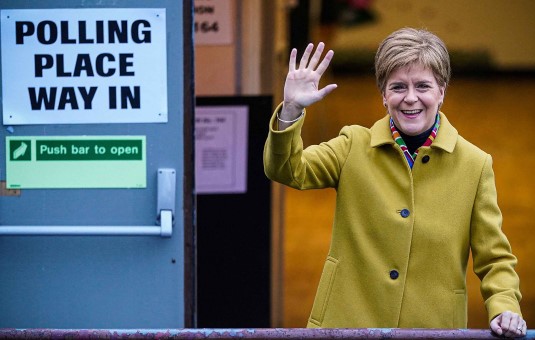
Party | Number of Candidates | Total Vote | % | +/- Q1 | +/- Q4 2019 | Average | +/- Seats |
Conservative | 6 | 7,239 | 26.5% | -11,5 | -12.2 | 1,207 | 0 |
Labour | 7 | 2,525 | 9.3% | -20.6 | -20.3 | 361 | 0 |
LibDem | 6 | 3,147 | 11.5% | -5.4 | -2.7 | 525 | +1 |
Green | 6 | 1,689 | 6.2% | +1.5 | -0.6 | 282 | 0 |
SNP* | 6 | 10,334 | 37.9% | +36.0 | +34.5 | 1,722 | -1 |
PC** | 0 | | 0 | ||||
Ind*** | 11 | 2,270 | 8.3% | +3.1 | +3.1 | 206 | 0 |
Other**** | 3 | 76 | 0.3% | -7.7 | -1.1 | 25 | 0 |
* There were eight by-elections in Scotland
** There were no by-elections in Wales
*** There were four contests with Independent clashes
**** Others this quarter consisted of Scottish Libertarian (16 votes and 42 votes), and UKIP (18 votes)
Heavens be praised for letting us have a clutch of by-elections in Scotland, which will be the only vote slip ballot box action we'll get until next May, Covids and vaccines permitting. Condensing the results from the two month's worth makes horrifying reading for Scottish Labour. True, these might not have been especially auspicious council wards, but come up. It was just six years ago that Labour dominated the landscape north of the border, and now they're a pathetic also-ran scrapping with the Tories for the declining remnants of the unionist vote. And losing. by contrast the SNP remains, by far, the most dominant party - a position unlikely to change with an unnecessarily damaging Brexit in the offing, and a seeming reluctance by Labour to try and win their former voters back. What a shambles.
Hmm, is this a late acceptance that unionism in Scotland, if not dead, is very ill? Squabbling over the soon to be a corpse resembles a contemporary version of .Burke and Hare
ReplyDelete"which will be the only vote slip ballot box action we'll get until next May".
ReplyDeleteNo idea if it is the only one but a contested election for a council seat is anticipated in Wrexham:
http://old.wrexham.gov.uk/assets/pdfs/elections/2020/Notice-of-vacancy-Maesydre.pdf
Time for Scottish Labour to set out it's stall for a federal UK? Something's got to change its embarrassing.
ReplyDeleteMarxists oppose moving from a unitary state to federal state. Johnson was at least right that devolution itself was a mistake, as it enhanced rather than undermined reactionary nationalist and separatist tendencies.
ReplyDeleteBut federalism offers no solution to Scots whose main concern is being trapped into Brexit. If the Tories continue with that ridiculous trajectory, federalism will not change that in Scotland, only an independent Scotland would. Given that its currently near impossible winning a parliamentary majority without Scotland, if Labour ever wants to be in government again it should want to retain Scotland, and that looks possible only by Labour opposing Brexit, something Starmer is refusing to do, as he acts as Johnson's jingoistic wingman.
Latest polling shows two-thirds of voters are either virulent Remainers or virulent Leavers, reflecting the fact that this is really a class cleavage down the lines of the progressive working-class on the former side, and the reactionary small capitalists on the other. The division is actually becoming even more entrenched, which makes Labour's attempt to sit in the middle of the road, but now more on the side of the reactionaries, all the more ludicrous.
Scots are unlikely to be fooled by the proposal of federalism, in conditions of Brexit, because all it means is that they would be tied into a decaying and declining Britain, now with greater responsibility to pick up their own bills, and without the benefits they could have from being an independent Scotland within the EU, i.e. frictionless access to its markets, large inflows of foreign capital, the movement of English capital to Scotland to retain access to the Single market and so on.